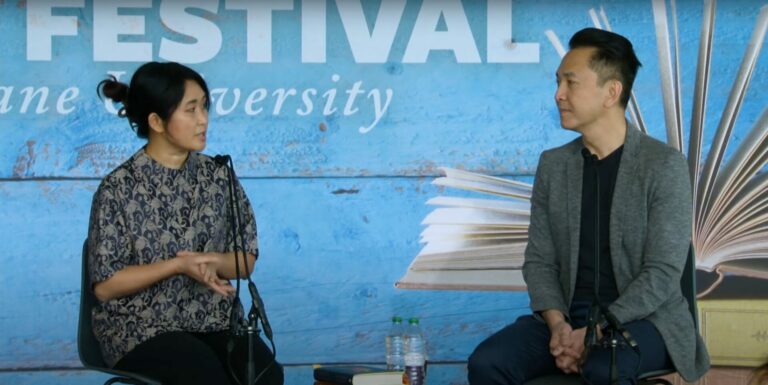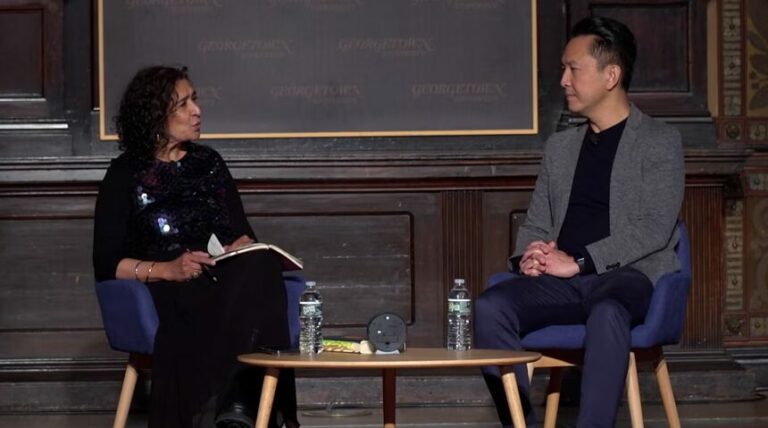Viet Thanh Nguyen speaks on what Afghan refugees can expect as they enter the United States with AJ+.
![Viet Thanh Nguyen in conversation with AJ+ [AJ+]](https://images.squarespace-cdn.com/content/v1/5f21dbb91adde3260d4ba1ef/1632504198290-FWRLQB59UY6QMJAOE2TS/clean+thumb+viet.jpg?format=750w)
Award-winning writer Viet Thanh Nguyen was 4 years old when Saigon fell.
As the U.S. pulled out of Vietnam, his family, staunch anti-Communists, fled to the States, landing in a refugee camp in Pennsylvania. Having survived the disastrous war, Nguyen faced racism and violence at his new American school.
He would go on to write a Pulitzer Prize-winning novel, The Sympathizer, a hard-eyed look at American imperialism and conflict within the Vietnamese diaspora, and the novel’s non-fiction counterpart, Nothing Ever Dies: Vietnam and the Memory of War, an extraordinary book about how violence and power work on mind and memory.
Now, recent events in Afghanistan have brought some of those memories to the forefront. Once again, those subject to America’s imperialist adventures are banging on the door, seeking to escape the conflagration as troops pull out. And once again, they are met with widespread indifference.
AJ+ producer Raji Ramanathan recently spoke with Nguyen about the unfolding crisis. Here are some of the main takeaways.
Nothing new under American empire
“Watching what’s happening now to Afghan refugees, I think a lot about what happened to me and to the 130,000 other Vietnamese refugees who had to flee in March and April of 1975,” Nguyen said.
While there are obvious differences between the two events, he believes that many Vietnamese Americans witnessing the news coverage felt an alarming sense of what was to come, because of their own experience of “being turned into refugees, having families be divided and separated, people lost, people losing … their property or their identities and their careers and all these other kinds of things.” As a result, Nguyen is certain that there will be “enormous emotional damage done to many Afghan refugees.”
Inherited trauma
That damage doesn’t end with a single generation. In The Sympathizer, conflicts from Vietnam spill over into refugee communities in California. Other writers, like poet Ocean Vuong, author of On Earth We’re Briefly Gorgeous, whose family sought asylum in the U.S. when he was 2, have traced the trauma of the Vietnam War through generations that span continents (it’s worth checking out Vuong and Nguyen in conversation).
“For Vietnamese refugees to leave a refugee camp, we had to have sponsors take us in,” Nguyen said, but no one wanted to take the entire family. “One sponsor took my parents. One sponsor took my 10-year-old brother. One sponsor took 4-year-old me. So my first memories are of being taken away from my parents, howling and screaming.” For Nguyen, there’s no question that these events would have a devastating impact on generations to come.
The “good” refugee
“Americans do not, on average, want to think about the fact that the United States is a de facto empire with around 800 military bases all over the world,” Nguyen said. Instead, refugees and immigrants “are expected to be quiet about these kinds of issues, and again, to express only their gratitude. And if you deviate from that as a refugee or an immigrant, you can expect that you will be rapidly censored or punished for expressing any kind of a point of view.”
One need look no further than the response to an Afghan refugee who pointed out the lack of food for refugees at Fort Bliss, in Texas, to see the lasting truth of Nguyen’s words. “I believe in an America that is equal for all, where immigrants and refugees have the right to be mediocre, just like every other American,” he said, instead of earning their keep through silence and hard work.
Nguyen believes that we should be looking at this another way, and asking questions like: “What does America owe to the people from the countries that the United States has intervened in, oftentimes without the consent of the people in those countries?”
Rejecting silence
The author and professor hopes that new generations of refugees won’t succumb to demands that they smile and keep quiet.
“I think there will be people who will want to speak out and to render what happened in Kabul and Afghanistan and afterwards in the United States in a much more complicated fashion than simply through the framework of American democracy and refugee gratitude,” Nguyen said.
Watch the whole interview on Facebook or read the transcript below.
Viet Thanh Nguyen: Refugees wouldn’t need to be aided by the United States if they hadn’t been invaded by the United States in the first place. We should be welcoming refugees on humanitarian principles and on the issue of moral debt and obligation that we as Americans owe to Afghans and to people of other countries that we have intervened in, and that’s putting it politely.
Viet Thanh Nguyen: My first memories really begin in a refugee camp in the United States at Fort Indiantown Gap in Pennsylvania. For Vietnamese refugees to leave a refugee camp, we had to have sponsors. In the case of my family, there was no sponsor willing to take all four of us so one sponsor took my parents, one sponsor took my 10 year old brother, one sponsor took four year old me. So my first memories are of being taken away from my parents, howling and screaming.
Viet Thanh Nguyen: Watching what’s happening now to Afghan refugees, I think a lot about what happened to me into and to the 130,000 other Vietnamese refugees who had to flee in March and April of 1975. These are not the same situations, these are not the same parallel, these are not the same politics, but I’m not alone. So many Vietnamese Americans I know responded so strongly to what they saw because they recognized that what was going to happen to so many Afghan people was what happened to their own families. Being turned into refugees, having families be divided and separated, having people be lost, losing their lives and losing their property and their identities and their careers, and all these other kinds of things.
Speaker 2: Follow through on the commitment made by the last administration to leave Afghanistan.
Viet Thanh Nguyen: The emotional impact on our families would continue for decades and that impact would continue for the children and the grandchildren who would be subject to the emotional devastation wreaked on their parents and their grandparents. In Afghanistan itself, as in Vietnam, I assume that the conflict will continue for quite a while, so in the aftermath of the war in Vietnam, for example, the victorious Vietnamese government did things like send their enemies to reeducation camps, persecute minorities, drive people to flee by boat, and so many other things. Wars again, don’t end simply because a cease fire or an end has been declared, the fallout will continue because people will hold bitter feelings on all sides, and often will take it out on people as well.
Viet Thanh Nguyen: I believe in America that it’s equal for all where immigrants and refugees have the right to be mediocre just like every other American. That’s a joke, but it’s also a truth that Americans do expect new immigrants and new refugees to somehow be better than the average American, as if that’s the price of entry into American society. Americans do not on the average want to think about the fact that the United States is a defacto empire with around 800 military bases all over the world. Refugees and immigrants can come to this country are expected to be quiet about these kinds of issues, and again, to express only their gratitude,
Viet Thanh Nguyen: There is going to be that impulse, I think for Afghans as there was for many Vietnamese refugees and immigrants not to be political, not to speak out, just to try to take care of their family and build their communities. But for a certain portion of that first generation and for a larger portion of the second generation, and I count myself as somewhere in between, there’s a counter impulse, which is to speak up, to be political, to hold the United States accountable, and to hold our own people accountable. And so I’m looking forward to seeing a growth of that kind of a voice in the Afghan American and Afghan refugee community because I think there will be people who will want to speak out and to render what happened in Kabul and Afghanistan and afterwards in the United States in a much more complicated fashion than simply through the framework of American democracy and refugee gratitude.


